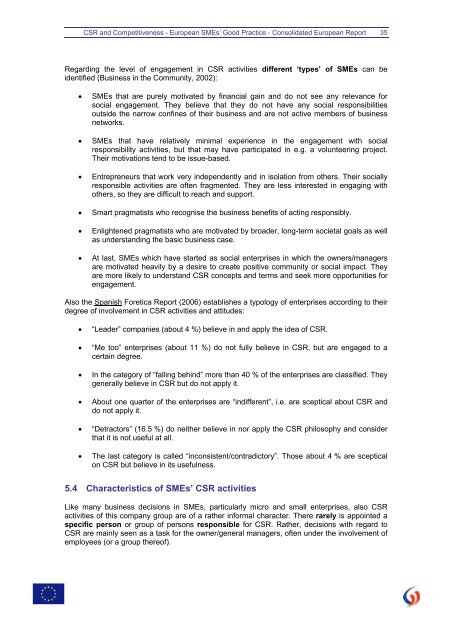CSR and Competitiveness European SMEs - KMU Forschung Austria
CSR and Competitiveness European SMEs - KMU Forschung Austria
CSR and Competitiveness European SMEs - KMU Forschung Austria
Create successful ePaper yourself
Turn your PDF publications into a flip-book with our unique Google optimized e-Paper software.
<strong>CSR</strong> <strong>and</strong> <strong>Competitiveness</strong> - <strong>European</strong> <strong>SMEs</strong>’ Good Practice - Consolidated <strong>European</strong> Report 35<br />
Regarding the level of engagement in <strong>CSR</strong> activities different ‘types’ of <strong>SMEs</strong> can be<br />
identified (Business in the Community, 2002):<br />
• <strong>SMEs</strong> that are purely motivated by financial gain <strong>and</strong> do not see any relevance for<br />
social engagement. They believe that they do not have any social responsibilities<br />
outside the narrow confines of their business <strong>and</strong> are not active members of business<br />
networks.<br />
• <strong>SMEs</strong> that have relatively minimal experience in the engagement with social<br />
responsibility activities, but that may have participated in e.g. a volunteering project.<br />
Their motivations tend to be issue-based.<br />
• Entrepreneurs that work very independently <strong>and</strong> in isolation from others. Their socially<br />
responsible activities are often fragmented. They are less interested in engaging with<br />
others, so they are difficult to reach <strong>and</strong> support.<br />
• Smart pragmatists who recognise the business benefits of acting responsibly.<br />
• Enlightened pragmatists who are motivated by broader, long-term societal goals as well<br />
as underst<strong>and</strong>ing the basic business case.<br />
• At last, <strong>SMEs</strong> which have started as social enterprises in which the owners/managers<br />
are motivated heavily by a desire to create positive community or social impact. They<br />
are more likely to underst<strong>and</strong> <strong>CSR</strong> concepts <strong>and</strong> terms <strong>and</strong> seek more opportunities for<br />
engagement.<br />
Also the Spanish Foretica Report (2006) establishes a typology of enterprises according to their<br />
degree of involvement in <strong>CSR</strong> activities <strong>and</strong> attitudes:<br />
• “Leader” companies (about 4 %) believe in <strong>and</strong> apply the idea of <strong>CSR</strong>.<br />
• “Me too” enterprises (about 11 %) do not fully believe in <strong>CSR</strong>, but are engaged to a<br />
certain degree.<br />
• In the category of “falling behind” more than 40 % of the enterprises are classified. They<br />
generally believe in <strong>CSR</strong> but do not apply it.<br />
• About one quarter of the enterprises are “indifferent”, i.e. are sceptical about <strong>CSR</strong> <strong>and</strong><br />
do not apply it.<br />
• “Detractors” (16.5 %) do neither believe in nor apply the <strong>CSR</strong> philosophy <strong>and</strong> consider<br />
that it is not useful at all.<br />
• The last category is called “inconsistent/contradictory”. Those about 4 % are sceptical<br />
on <strong>CSR</strong> but believe in its usefulness.<br />
5.4 Characteristics of <strong>SMEs</strong>’ <strong>CSR</strong> activities<br />
Like many business decisions in <strong>SMEs</strong>, particularly micro <strong>and</strong> small enterprises, also <strong>CSR</strong><br />
activities of this company group are of a rather informal character. There rarely is appointed a<br />
specific person or group of persons responsible for <strong>CSR</strong>. Rather, decisions with regard to<br />
<strong>CSR</strong> are mainly seen as a task for the owner/general managers, often under the involvement of<br />
employees (or a group thereof).




